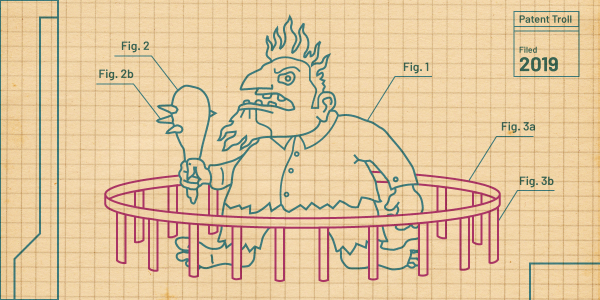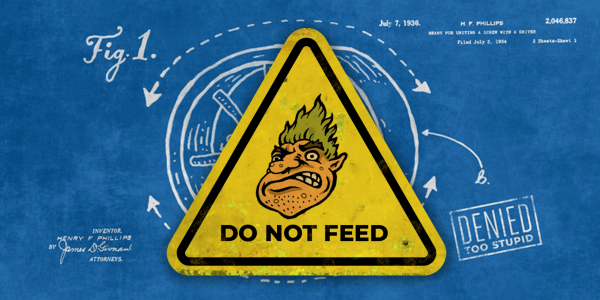Suche
Beiträge, die mit Patents getaggt sind
Despite significant progress we’ve made over the last decade, patents, and in particular vague software patents, remain a serious threat to online rights. The median patent lawsuit isn't filed by what Americans would recognize as an ‘inventor,’ but by an anonymous limited liability company that provides no products or services, and instead uses patents to threaten others over alleged infringement. In other words, a patent troll. In the tech sector, more than 85% of patent lawsuits are filed by these “non-practicing entities.”
That’s why at EFF, we continue to help individuals and organizations fight patent threats related to everyday activities like using CAPTCHAs and picture menus, tracking packages or vehicles, teaching languages, holding online contests, or playing simple games online.
Here’s where the fight stands as we move into 2025."
https://www.eff.org/deeplinks/2024/12/fighting-progress-patents-2024-review
#Patents #PatentTrolls #IP #USA
Bad news: the committee is still pushing the PREVAIL Act, a bill that would hamstring the U.S.’s most effective system for invalidating bad patents. PREVAIL is a windfall for patent trolls, and Congress should reject it.
One of the most effective tools to fight bad patents in the U.S. is a little-known but important system called inter partes review, or IPR. Created by Congress in 2011, the IPR process addresses a major problem: too many invalid patents slip through the cracks at the U.S. Patent and Trademark Office. While not an easy or simple process, IPR is far less expensive and time-consuming than the alternative—fighting invalid patents in federal district court."
#USA #Patents #IP #PatentTrolls
https://www.eff.org/deeplinks/2024/11/prevail-act-would-wreck-us-patent-review-system
The Senate Judiciary is also scheduled to vote on the PREVAIL Act (S. 2220) that seeks to severely limit the public’s ability to challenge bad patents at the patent office. These challenges are among the most effective tools for eliminating patents that never should have been granted in the first place.
Passing these bills would sell out the public interest to a narrow group of patent holders. EFF stands together with a broad coalition of patients rights groups, consumer rights organizations, think tanks, startups, and business organizations to oppose these harmful bills.
This week, we need to show Congress that everyday users and creators won’t support laws that foster more patent abuse. Help us send a clear message to your representatives in Congress today."
https://www.eff.org/deeplinks/2024/11/tell-congress-stop-these-last-minute-bills-help-patent-trolls
#USA #Patents #IP

Tell Congress To Stop These Last-Minute Bills That Help Patent Trolls
This week, the Senate Judiciary Committee is set to use its limited time in the lame-duck session to vote on a bill that would make the patent system even worse. The Patent Eligibility Restoration Act (S.Electronic Frontier Foundation
https://theconversation.com/in-rural-america-right-to-repair-laws-are-the-leading-edge-of-a-pushback-against-growing-corporate-power-199372
"Under the agreement, John #Deere promises to give farmers and independent repair shops access to manuals, diagnostics and parts. But there’s a catch – the agreement isn’t legally binding, and, as part of the deal, the influential #FarmBureau promised not to support any federal or state #RightToRepair legislation."
#patents

In rural America, right-to-repair laws are the leading edge of a pushback against growing corporate power
Corporations restrict what farmers can do with their own seeds, as well as their farm equipment when it breaks down.The Conversation
https://www.cell.com/iscience/fulltext/S2589-0042(23)01817-5
#Funders #OAintheUSA


